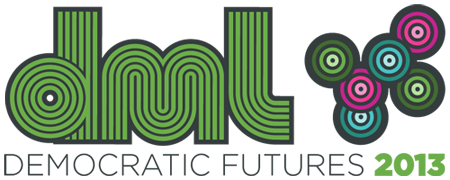WC: Click, Meme, Hack, Change: Civic Media Theory and Practice
We define Civic Media as the intersection of two spheres: civic engagement and participatory media. The read/write culture of participatory media suggests that issues of public interest and concern are now open to broader participation than in an earlier broadcast culture. We are seeing new forms of civic engagement emerge that go beyond voting and participating in political meetings, and involve techniques as well understood as online organizing and media creation, and as novel as protest through cyberattack.
Native to the participatory culture of the internet is the idea of the meme: ideas created by individuals that spread rapidly through acts of amplification and remix. Two years ago, discussions of memes mostly concerned lolcats and the occasional viral video. But memes now classify as widely-accepted political speech, receiving breaking news-like priority on television coverage of the 2012 US presidential election. Memes may have played a role in Obama's victory, and certainly played a role in the Occupy movement's media-based campaign against inequality.
Memes aren’t just clever phrases and funny words though, they are invitations to participate in behaviors modeled by others or to interpret through one’s own remix practices. The ramifications of this are starting to come clear in activisms like distributed denial-of-service (DDOS). Activist DDOS actions invite participants to engage with others across a distributed platform that joins their discrete actions into one coherent event, with strong implications for how these individuals identify as activists and community members later. The Low Orbit Ion Cannon (LOIC) is a tool for running a DDOS attack, designed and used by Anonymous in a variety of online actions. But LOIC is not simply a civic action tool; it has evolved to represent explicit strategies of media manipulation and identity construction for a community of activists under the guise of Anonymous.
But Civic Media is not all new tools; it’s also the traditional made new. Change.org has augmented the online petition with professional media outreach and top-tier strategists to make it a powerful force for building international campaigns. Successes include justice for Trayvon Martin and the selection of a female moderator for a US presidential debate. Change.org represents the growing legitimation of low barriers to entry online activism, disregarded as clicktivism or slacktivism, that provides access to powerful tools to those who may struggle to find their voice in most civic spaces.
These civic media practices all embody the participatory as accessible and inclusive practices, however their activations of distributed communities don’t fit neatly into accepted theories of change such as traditional organizing and lobbying. A theory of change for media activism hinges instead on winning the attention economy and pushing for cultural transformation. So what does this kind of framework for change mean in terms of civic media’s ability to scale or sustain? On which types of issues might it be most effective or least effective? And how are we able to study these practices quantitatively and qualitatively?



